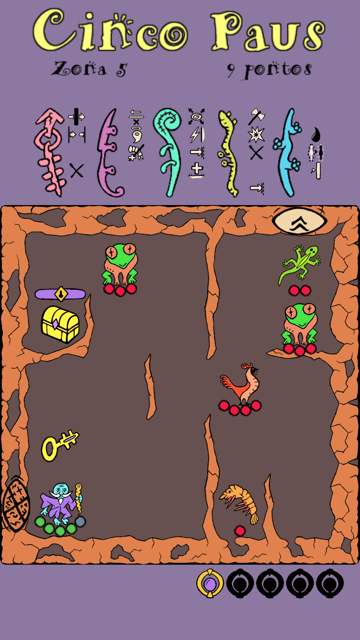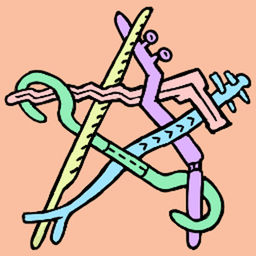9/13/2021
Review of Cinco Paus
Developed by: Michael Brough
2017, ios/windows/mac

Cinco Paus is magical in many ways. It's name comes from the tarot card the five of wands, or maybe it's sticks. You play as a wizard who shoots magic wands. And when I play the game, it feels like it performs some kind of magic trick on me.
When I started Cinco Paus, I spent the first few weeks figuring out how the wand effects worked. Piecing together what the different icons meant was a fun game on its own, but once I discovered all of them, I started to get worse. I would usually die within the first few games and I couldn't get a higher score. The more I played it, the worse I got, and I figured the game was based too much on luck. It seemed like the only way to get a good score was to have wands with the more helpful effects, and that eventaully my luck would run out and a bad wand would end the streak, so I stopped playing at that point.
I went back to the game again six months later, and I immediately doubled my previous high score. The reason, I later realized, was that I had forgotten what a lot of the wand icons meant, so I was playing slowly. If you've already played the game but haven't completely gotten into it, I'd recommend watching this video by Vivafringe. I was playing slowly and thinking through different options each turn like in this video, and that opened up the game for me.
Cinco Paus does the best thing a strategy game can do: make you feel creative. It constantly gives you problems to solve by using your ability to think outside of the obvious moves. It often seems like you're in an impossible situation, but if you run through a few other options, you can usually find a better solution. It feels great when you discover a new way to get through the level that you didn't see at first, and this happens all of the time in Cinco Paus.
The whole game is so tightly knotted together that every move matters. Even when all of the enemies are gone, there are multiple decisions to make about how to test the unused wands and get the treasure before the frogs show up. If you take one step, the entire situation changes and there's a new problem to solve. Roguelikes are, maybe at their most enjoyable, an interesting story generator. Every enemy and object has their own properties that can interact with eachother. You throw these different components together and they end up making a series of events that is particular to that one time you played the game. Cinco Paus is an interesting situation generator. It gives you a problem every turn that you can solve with creative thinking.

This is where the game starts to feel like magic to me. If you don't pay attention, the game will pass you by and it will feel impossible. If you pay attention and look for other options, it opens up and you can survive for 50 games in a row. It also does something that I'm not sure is in my imagination or not, but whenever I've run out of other options and have to blindly fire a wand without everything identified on it at an enemy, it usually does something helpful. Maybe that's because more of the effects are helpful than not, but it feels like the game wants you to trust it.
If self-referentiality is a signifier that something's art, Cinco Paus is named after a magic card, you play as a wizard casting magic wands, and it makes me feel like the world is magic when I play it. I don't think there's anything more I could ask for from an art thing.